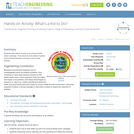
Cover Sheet
Teacher Example
- Subject:
- Arts and Humanities
- Early Childhood Development
- Education
- Special Education
- Material Type:
- Activity/Lab
- Date Added:
- 07/06/2019

Cover Sheet
Teacher Example

This course studies important twentieth century texts from Spain and Latin America. The readings include short stories, theatre, the novel and poetry. This subject is conducted in Spanish and all reading and writing for the course is also done in Spanish.

This intensive and brief 4-day seminar, taught during MIT’s Independent Activities Period in January, uses a case set in Hartford, Vermont to introduce economic development planning skills to students in the Master in City Planning (MCP) Degree Program. It introduces analytical tools that are used to assess local economic development conditions, issues, and opportunities as part of formulating economic development plans. The course is designed to provide MCP students with skills needed for applied economic development planning work in other courses, particularly Economic Development Planning (11.438) and Revitalizing Urban Main Streets (11.439).

This course is aimed at the aspiring planning practitioner, policy-maker, or industry decision-maker with an interest in urban transportation and environmental issues in Latin America. The course will focus on current transport-related themes confronting many cities in the region, including: rapid motorization and suburbanization and subsequent impacts on transportation infrastructure and quality of life; public sector management and improvement of privately-owned and operated transit systems; and, transportation air pollution problems and potential solutions.
The course will be geared towards interactive problem-solving, taking advantage of students’ skills and experiences in: institutional analysis, policy analysis, and project and program evaluation and implementation. Detailed knowledge of transportation planning is not required; instead, the course will attempt to place the general practitioner into a specific transportation public policy situation and draw from her skills to devise real solutions. To fulfill this problem-solving orientation, the course will be divided into two parts. Part I of the course will consist of a series of lectures on the principal issues surrounding transportation in the developing world (including motorization, fiscal pressures, urban sprawl), concepts of sustainability as they relate to urban transportation, regional strategic planning approaches, and transportation policy and technology options and examples of successful implementation.
After these lectures, Part II of the course will be dedicated to the two case studies, where students will apply the knowledge gained in Part I to develop strategic solutions to the transport-land use-environment challenges in two different cities.

Students write letters as part of an environmental action campaign. They become more aware of global environmental problems and play a part in their solution.